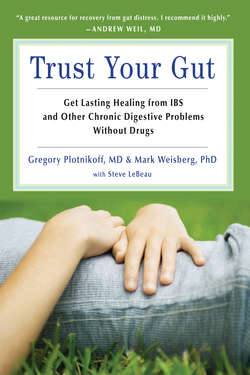Читать книгу Trust Your Gut - Gregory Plotnikoff - Страница 42
На сайте Литреса книга снята с продажи.
A Breakdown in (Gut) Communication
ОглавлениеThe gut's ability to communicate to us has been understood as normal for thousands of years all over the world. References to the importance of the feelings of the gut can be found in the Bible as well as in traditional Japanese medicine. But when did gut communication break down in the Western tradition and become seen as symptoms—something abnormal? When did we start to shut down or dismiss these crucial internal lines of communication?
To answer, we need to go all the way back to ancient Greece during the days of Plato and Aristotle. These early philosophers were part of a movement to use reason to rule our life instead of being guided by our emotions or superstitions. Plato placed such a high value on reason and mathematics that he considered them to be the highest forms of knowledge, closer to the mind of God and the higher unchanging realm of pure ideas. Emotions yielded insignificant information about the ever-changing world of everyday existence. Aristotle, one of the founders of Western science, agreed on the value of reason over emotion. Even lower in esteem than emotions was the body, which was considered a crude vessel that imprisoned the soul.
By the 1600s, many influential philosophers, most famous among them René Descartes, argued that the mind and the body were separate substances, dual realities. The mind was eternal and invisible—known only by our own consciousness. Our body was considered to be merely a complex machine. And so began medicine's distrust of the body's knowledge and the body's wisdom.
These philosophers did not have the advantage of our 21st-century technology like functional MRI scanners that allow us to actually look into the brain and literally see the chemical reactions taking place. Scientists can now observe which genes get turned on and turned off by emotional response. Human beings can now measure scientifically the interactive effects of mind and body upon each other. However, hundreds of years ago, the mind was viewed as nonmaterial, considered only within the domain of religion. Somehow the mind was less real because you can't see it or put it in a wheelbarrow. Not so with the body. This was viewed as tangible, material, real—within the domain of science. The mind was split off from the body. Though this happened hundreds of years ago, these ideas shape how we view health, illness, and our relationship with our body today.
The Industrial Revolution disconnected us even further from our natural ability to communicate with our body. New inventions allowed us to predict, measure, and control aspects of our life that were previously impossible. Manufactured chemicals were produced on a mass scale for many uses. Germ theory and vaccinations helped contain life-threatening diseases like smallpox. Scientists looked at the body as if it were only a machine, an orientation that led to many scientific advances, such as organ transplants.
This great medical progress was a double-edged sword. Although we learned that it was possible to treat and eliminate many diseases, we increasingly came to believe that painful or unusual bodily sensations should be eradicated. Accepting and listening to sensations seemed pointless. Likewise, we rejected any connection between mind and body. How could a nonmaterial thing like the mind affect a material thing like the body? Such a crazy idea violates the laws of physics. After all, no matter how hard we think, pray, or believe, we cannot get a frozen car to start on a winter morning. Mind has no effect on machines.
